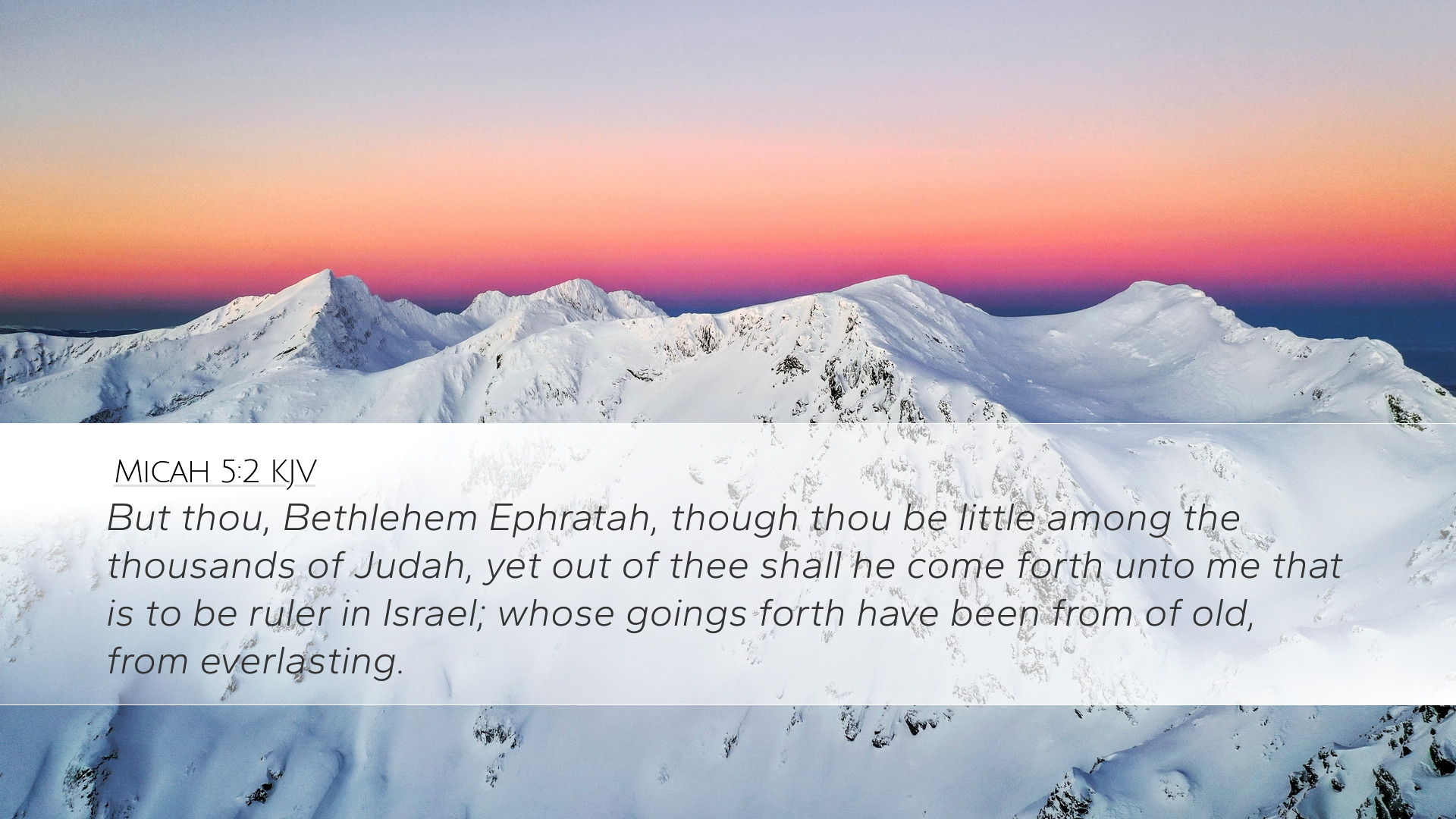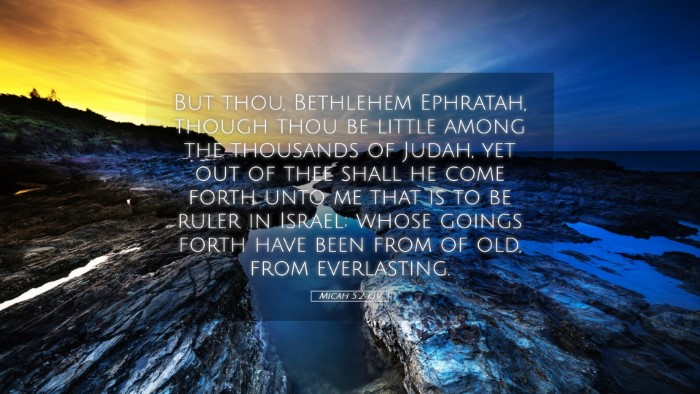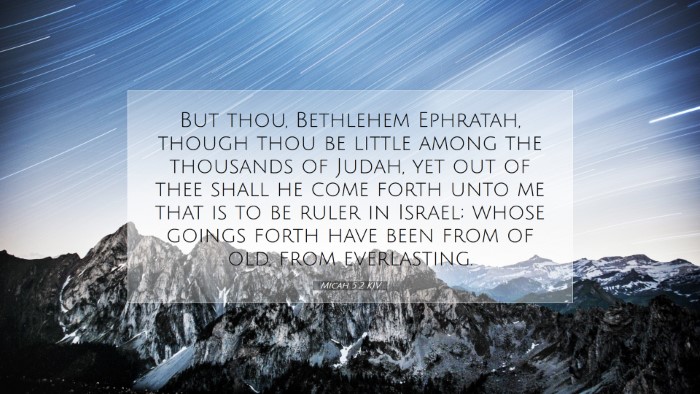Old Testament
Genesis Exodus Leviticus Numbers Deuteronomy Joshua Judges Ruth 1 Samuel 2 Samuel 1 Kings 2 Kings 1 Chronicles 2 Chronicles Ezra Nehemiah Esther Job Psalms Proverbs Ecclesiastes Song of Solomon Isaiah Jeremiah Lamentations Ezekiel Daniel Hosea Joel Amos Obadiah Jonah Micah Nahum Habakkuk Zephaniah Haggai Zechariah MalachiMicah 5:2
Micah 5:2 KJV
But thou, Bethlehem Ephratah, though thou be little among the thousands of Judah, yet out of thee shall he come forth unto me that is to be ruler in Israel; whose goings forth have been from of old, from everlasting.
Micah 5:2 Bible Commentary
Commentary on Micah 5:2
Micah 5:2 is a pivotal verse in the context of the Old Testament prophecy concerning the birth of the Messiah. This verse reads:
"But you, Bethlehem Ephrathah, though you are small among the clans of Judah, out of you will come for me one who will be ruler over Israel, whose origins are from of old, from ancient times."
Contextual Background
Micah, a prophet from Moresheth, prophesied during the 8th century B.C.E., amid the tumultuous backdrop of Israel's political instability and moral decay. The Book of Micah addresses issues of social injustice, religious hypocrisy, and the impending judgment of God on both Israel and Judah.
Significance of Bethlehem
The mention of Bethlehem Ephrathah, a small and seemingly insignificant town, carries immense theological weight. Matthew Henry emphasizes the contrasting nature of God's choice. Though Bethlehem is small (Hebrew: "tz'ir"), it plays a monumental role in salvation history.
Prophetic Fulfillment
Albert Barnes notes that this prophecy is foundational, not only in its immediate context but also as it is fulfilled in the New Testament with the birth of Jesus Christ in the city of Bethlehem. This fulfillment validates the sovereignty and providence of God, showing that He often chooses the least likely circumstances to accomplish His divine purpose.
Theological Insights
- Divine Sovereignty: The verse underlines God's sovereign choice in leadership and His method of bringing forth rulers. Adam Clarke elaborates on this point, indicating that while human kings may rise from noble lineage or great cities, God's ruler, the Messiah, emerges from a humble origin.
- Messianic Expectation: The reference to "one who will be ruler" anticipates a kingly figure, which resonates throughout Messianic prophecies. Both Henry and Barnes affirm that the verse points directly to Jesus, whose lineage, coming from David's line, underscores the fulfillment of this ancient promise.
- Timelessness of Christ: "Whose origins are from of old, from ancient times" speaks to the pre-existence of Christ. Clarke references this idea by explaining that the Messiah's origins in eternity affirm the mystery of the hypostatic union—Jesus as fully God and fully man.
Expository Thoughts
The verse can be broken down into several meaningful components:
- Bethlehem Ephrathah: The specific delineation of Bethlehem highlights God's attention to detail and His involvement in human history. No geographical anomaly escapes God's knowledge.
- Insignificance: The phrase "though you are small" serves as a reminder that God often subverts human expectation. This theme recurs throughout scripture where God utilizes unlikely vessels for His divine purposes.
- The Ruler’s Authority: “One who will be ruler over Israel” suggests the establishment of a new kingdom characterized by righteousness and peace, a crucial expectation for the Israelites facing oppression.
Application for Today
This verse continues to hold relevance for modern Christians:
- Hope in Despair: Amidst current societal issues—whether political strife, social injustice, or personal despair—Micah 5:2 reminds believers that God’s plan unfolds, often in the most unexpected ways.
- Trust in God's Plan: Like Bethlehem, our personal and communal situations may feel insignificant, yet God can elevate our lives and circumstances for His purpose. It calls for a faith-filled trust in God's timing and methods.
- Embracing the humble: In a culture that often idolizes success and prominence, this verse calls believers to recognize and value humility and obedience, traits God favors.
Conclusion
Micah 5:2 stands as a rich tapestry of theological insights and prophetic depth, highlighting God's marvelous plan for redemptive history through seemingly insignificant means. As noted by the esteemed commentators, its implications resonate deeply with the Christian faith, as it points directly to Jesus Christ, the awaited Messiah—the ruler who offers hope and establishes a kingdom marked by justice, mercy, and peace.


